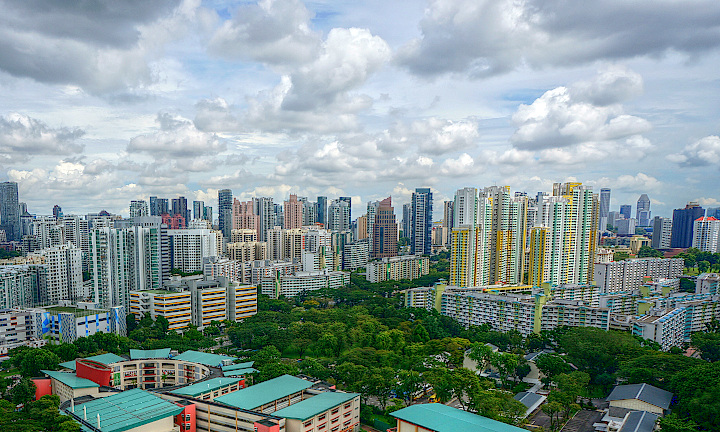The Bachelor of Engineering (Hons) degree in Civil Engineering with a Second Major in Society & Urban Systems is jointly offered by the School of Civil and Environmental Engineering and the College of Humanities, Arts, and Social Sciences.
The programme equips Civil Engineering students with socio-economic and environmental perspectives, and provides important integration with Civil Engineering’s proficiency in infrastructure development and urban solutions. Students will be equipped with knowledge in social sciences aspects of urban systems planning and policy-making, while maintaining a firm engineering foundation over the usual programme duration (i.e. 4 years).
The programme comprises the following courses:
- Foundation Core Courses (4 Courses)
Urban Planning and Design; Integrated Urban Management; Leaders in Urban Systems & Policy; Principles of Economics - Urban Economics and Public Policy (Choose 3 courses)
Examples of courses: Public Economics, Health Economics, Environmental Economics, Urban Economics, Environmental Sociology - Society and Culture (Choose 2 courses)
Examples of courses: Social Problems in a Global Context, Understanding Globalization, Ethnicity and Ethnic Relations, Migration & Multiculturalism, Environmental Ethnics - Water & Environmental Management (Choose 1 Course)
Examples of courses: Environmental Quality, Air Quality Management, Energy Resources Management, Environmental Impact Assessment
- 4 years direct honours programme
- Accredited and globally recognised programme
- 20 weeks Professional Internship
- Specialisation in Coastal Protection
Singapore-Cambridge GCE 'A' Level
- Pass in H2 Level Mathematics, and
- Pass in H2 Level Biology/ Chemistry/ Computing/ Physics, and
- Pass in H1/ ‘O’ Level Physics1 or equivalent
Polytechnic Diploma
- A diploma from one of the local polytechnics,
- Relevant diplomas will be considered for exemption from selected courses,
- For a list of acceptable local diplomas, please refer here.
International Baccalaureate Diploma
- Pass in Higher Level Mathematics, and
- Pass in Higher Level Biology/ Chemistry/ Computer Science/ Physics, and
- Pass in Standard Level Physics2 or equivalent
NUS High School Diploma
- Major CAP of 2.0 in Mathematics, and
- Major CAP of 2.0 in Biology/ Chemistry/ Physics, and
- Overall CAP of 2.0 in Physics3 or equivalent
International & Other Qualifications
- Pass in Senior High School Level Mathematics, and
- Pass in Senior High School Level Biology/ Chemistry/ Physics, and
- Pass in Junior High School Level Physics4
NOTES
1 Pass in H1 Level / ‘O’ Level Physics is only applicable to applicants who have not read H2 Level Physics. Applicants with a good grade in 'O' Level Combined Science [(Physics and Chemistry) or (Physics and Biology)]
will be considered.
2 Pass in Standard Level Physics is only applicable to applicants who have not read Higher Level Physics.
3 Overall CAP of 2.0 in Physics is only applicable to applicants
who have not majored in Physics.
4 Pass in Junior High School Level Physics is only applicable to applicants who have not read Senior High School Level Physics.
Applicants with only a H1 Level / ‘O’ Level pass in Physics are required to read 'PH1012 Physics A' instead of 'PH1011 Physics' in their first semester. Computer Engineering and Computer Science students will read 'SC1013 Physics for Computing' instead.
International Students
International students must have completed at least 12 years of general education, or will be taking Year 12 national examinations in the year of application in order to be considered for admission.
In addition to fulfilling the minimum entry requirements, applicants must also satisfy the minimum subject requirements. For further details, please refer here.
INFORMATION & ENQUIRIES
Admission matters are handled by the Office of Admissions.
For further information and enquiry, please contact the
Office of Admissions.
Students with outstanding Singapore GCE ‘A’ Level, International Baccalaureate (IB) and NUS High School Diploma results may be eligible for exemptions from up to 3 selected first-year courses, more details could be found via the following link.
Students with outstanding Poly Diploma results may be eligible for exemptions from selected courses.
Besides the Core Programme Requirement, students need to fulfill a minimum total of 30 AU for Second Major in Society and Urban Systems
- Foundation Core courses (4 courses, 12 AU),
- Specialised Elective Courses (6 Courses, 18 AU) from 3 areas:
- Urban Economics and Public Policy (Choose 3, 9 AU);
- Society and Culture (Choose 2, 6 AU);
- Water and Environmental Management (Choose 1, 3 AU)
Further information on Second Major in Society and Urban Systems can be found on this page.
Details on curriculum structure can be found on this page.
In addition to career opportunities in infrastructure development for Civil Engineering graduates, the Second Major in Society and Urban Systems provides the impetus to diverse career options in the fields related Sustainable Urban Planning, such as the following:
- Sustainable Urban Development and Built Environment
- Economic Development, Housing and Real Estate
- Environmental Integration and Management
- Urban Transportation Planning and Management
- Sustainable Resource Management
- Research and Consultancy
Click here to find out about our graduates in diverse exciting jobs in various sectors.
Graduates can also look forward to a plethora of career opportunities and professional development in the public sector including the public agencies:

There are more than 40 minors available. Some popular minors are as follows,
- Minor in Business
- Minor in International Trading
Full list could be found via the following link.
Related Programmes
- Double Degree in Bachelor of Engineering in Civil Engineering and Bachelor of Social Science in Economics
- Bachelor of Engineering in Civil Engineering with Second Major in Data Analytics
- Bachelor of Engineering in Civil Engineering with Second Major in Business
- Bachelor of Engineering in Civil Engineering with Second Major in Entrepreneurship
- Bachelor of Engineering in Civil Engineering
- Bachelor of Engineering in Civil Engineering with Second Major in Sustainability














/enri-thumbnails/careeropportunities1f0caf1c-a12d-479c-be7c-3c04e085c617.tmb-mega-menu.jpg?Culture=en&sfvrsn=d7261e3b_1)

/cradle-thumbnails/research-capabilities1516d0ba63aa44f0b4ee77a8c05263b2.tmb-mega-menu.jpg?Culture=en&sfvrsn=1bc94f8_1)

7e6fdc03-9018-4d08-9a98-8a21acbc37ba.tmb-mega-menu.jpg?Culture=en&sfvrsn=7deaf618_1)


71c552b9-56d0-4df7-a4b1-8ea31da180b9.png?sfvrsn=71e9d4da_3)


